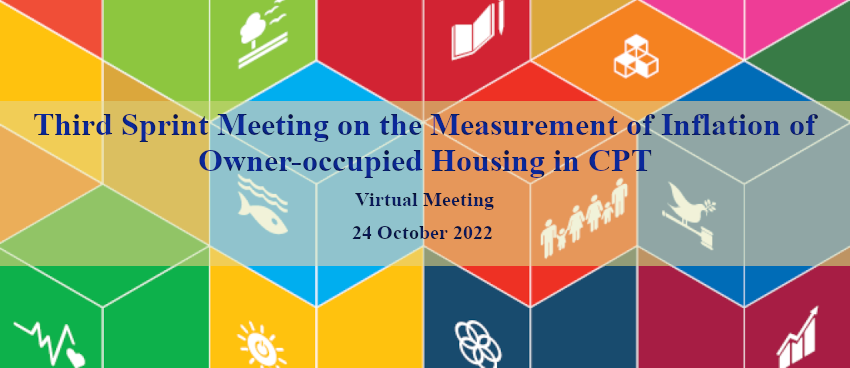The third meeting will focus on gathering inputs from participants on the proposed next steps for improving the international comparability and quality of national CPIs, including the services costs of owner-occupied housing. Additionally, there will be a presentation on the work that Statistics South Africa has been doing to measure these costs in its CPI.
Wednesday, 24 October 2022, 7:00 to 10:00am (New York time)
Chair: Paul Konijn, Head of the Price Statistics, Purchasing Power Parities and Housing Statistics Unit at Eurostat
7:00 am - 7:15 am
Session 1 | Introduction, welcome remarks, and scene-setting
Welcome remarksRonald Jansen, Assistant Director of the UN Statistics Division and Chief of the Data Innovation and Capacity Management Branch
Summary report from the Second Sprint MeetingFrantisek Bernadic, Director of macro-economic statistics, Eurostat
7:15 am - 7:35 am
Session 2 | Owner occupied housing in the South African CPI: weighting and pricing
The presentation will sketch the history of OOH in the South African CPI, the methods used for calculating weights and recording prices and some results.
Presenter: Presentation by Patrick Kelly, South AfricaPresentation: Owner occupied housing in the South African CPI
7:35 am - 8:30 am
Session 3 | Plenary Discussion
The objective of the plenary discussion is to gather input on the following proposed next steps meant to advance the comparability and utility of
CPIs across the globe:
8:30 am - 8:45 am
Break
8:45 am - 9:50 am
Session 3 | Plenary Discussion (Continued)
In this second part of the Plenary, participants are asked to provide their views on the proposal that the exploration of a harmonized method be entrusted jointly to the existing groups dedicated to improving the quality of the CPI, i.e. the Intersecretariat Working Group on Price Statistics and the Ottawa Group on Price Indices.
9:50 am - 10:00 am
Session 4 | Consolidating discussion, next steps, and closing remarks
This session will synthesize the discussion and present the next steps.
10:00 am
Adjourn
Active City Groups
Completed Group
Contact Us
Network Members
(As of 17 March 2025)
Countries
- • Argentina
- • Australia
- • Bhutan
- • Brazil
- • Canada
- • Colombia
- • Costa Rica
- • Côte d'Ivoire
- • Fiji
- • Indonesia
- • Italy
- • Lesotho
- • Maldives
- • Mexico
- • Mongolia
- • Morocco
- • Netherlands (Kingdom of the)
- • New Zealand
- • Oman
- • State of Palestine
- • Poland
- • Saudi Arabia
- • South Africa
- • Tunisia
- • United Kingdom of Great Britain and Northern Ireland
- • United Arab Emirates
- • United States of America
Organizations
- • Asian Development Bank
- • European Commission
- • International Labour Organization
- • International Monetary Fund
- • Islamic Development Bank
- • Meikai University
- • Organisation for Economic Co-operation and Development
- • United Nations
- • United Nations Development Programme
- • United Nations Economic and Social Commission for Asia and the Pacific
- • United Nations Economic and Social Commission for Western Asia
- • United Nations Economic Commission for Europe
- • United Nations Economic Commission for Latin America and the Caribbean
- • World Bank
- • World Health Organization

